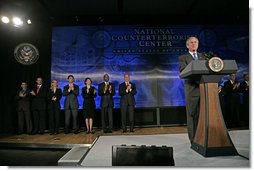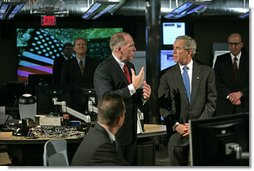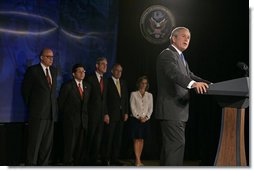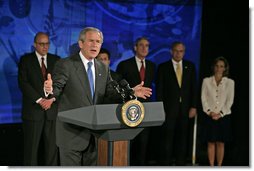
 |
For Immediate Release
Office of the Press Secretary
June 10, 2005
President Visits National Counterterrorism Center
National Counterterrorism Center
McLean, Virginia
|
|||||
10:15 A.M. EDT
THE PRESIDENT: Thanks for the warm welcome. It is really exciting to come and spend time in this fine facility and to meet the men and women who work at the National Counterterrorism Center. I just met with some who spend long hours preparing threat assessments, and it was my honor to tell them how much I appreciate their hard work and appreciate the daily briefing I get every single morning.
 I want to thank you all for taking on such demanding assignments
and important assignments. My message to the folks here is, thanks for
being on the front line and protecting America during the war on
terror. You know, it's a different kind of war. It's a war that seems
like there's maybe no action taking place, that maybe the enemy is not
active. You know, I was concerned after September the 11th that the
tendency would be to forget the nature of the people with whom you deal
on a daily basis. But I understand that there is an enemy that still
lurks, and you know it, as well.
I want to thank you all for taking on such demanding assignments
and important assignments. My message to the folks here is, thanks for
being on the front line and protecting America during the war on
terror. You know, it's a different kind of war. It's a war that seems
like there's maybe no action taking place, that maybe the enemy is not
active. You know, I was concerned after September the 11th that the
tendency would be to forget the nature of the people with whom you deal
on a daily basis. But I understand that there is an enemy that still
lurks, and you know it, as well.
And so on behalf of a grateful nation, I want to thank you for working hard to protect America. I want to thank you for your dedication, I want to thank you for your service and sacrifice.
The NCTC plays a key part in the Office of the Director of National Intelligence. It's a crucial part of making sure that we can say to the American people, we're collecting intelligence and information and we're sharing intelligence and information across jurisdictional lines to better protect the people and do our most solemn duty, which is to protect America.
And I want to thank Ambassador and Director John Negroponte's leadership on this issue. I want to thank him for his willingness to step forward to serve. And I appreciate his understanding of how important the NCTC is.
I also want to thank John Brennan, who has been the Acting Director of the NCTC. I can remember first meeting John -- it probably seems like a decade ago for him -- (laughter) -- I think it was actually a couple of years ago, when he first described what this facility would be like. He laid out the vision for what would take place here, and I want to thank John for his leadership, his dedication to the effort. It must bring John great comfort, as well as those who have worked with John, to see how this facility has evolved over time. This is a magnificent blend of technology and human talent, all working together to break down walls and barriers that had existed prior to September the 11th, to better protect the people.
And today I'm pleased to announce the fact that upon John Negroponte's recommendation, that we will nominate Vice Admiral John Redd to be the Director of the NCTC. He's a man of enormous experience. He has served our country with distinction. He'll be a good boss. He'll be a person that will be able to carry on the tradition of John Brennan.
 I appreciate the Attorney General traveling with me today. We're
not only talking about intelligence sharing, we're telling about --
we're talking about how to act upon that intelligence today. Attorney
General Al Gonzales is doing a fine job, as is the Director of the FBI,
Bob Mueller. I also appreciate Porter Goss, who is running the CIA,
for joining us today. I went out to the CIA the other day and I
reminded the good folks who work there that CIA stands for Central
Intelligence Agency. The CIA is a vital part of making sure that this
country is safe and sound, and a vital part of making sure that my
administration and myself get the type of information necessary to make
the decisions that we need to make to make the world a more peaceful
place.
I appreciate the Attorney General traveling with me today. We're
not only talking about intelligence sharing, we're telling about --
we're talking about how to act upon that intelligence today. Attorney
General Al Gonzales is doing a fine job, as is the Director of the FBI,
Bob Mueller. I also appreciate Porter Goss, who is running the CIA,
for joining us today. I went out to the CIA the other day and I
reminded the good folks who work there that CIA stands for Central
Intelligence Agency. The CIA is a vital part of making sure that this
country is safe and sound, and a vital part of making sure that my
administration and myself get the type of information necessary to make
the decisions that we need to make to make the world a more peaceful
place.
I appreciate Fran Townsend, who is my Homeland Security Advisor. Fran is constantly briefing me on interagency issues and keeping me up to speed about the work you're doing.
Today we're also joined by federal prosecutors and law enforcement officials who have helped bring terrorists to justice with the help of the Patriot Act. I'll talk about them in a minute. Thank you all for coming.
The purpose of the NCTC is to make sure our government has the information we need. It's an information-gathering organization. It is all aimed -- all the work here is aimed at keeping America safe. A lot of Americans have never heard of the NCTC. One of the reasons I came by was hopefully it will help draw attention to the good work you do here, so that the people of this country can be comforted in knowing that 24 hours a day there's some really fine people spending a lot of time doing whatever they can to protect our fellow citizens.
September the 11th showed that protecting America requires that we remove walls between agencies. Here at the NCC, men and women from different agencies, of different backgrounds, work side-by-side to share information, to analyze information, to integrate information. See, prior to the attack, it was -- we kind of all went about our own merry way. There was some interagency dialogue, but not a lot. And we learned a lesson about having walls between our agencies, and we're tearing those walls down. And here's a classic example of government working -- functioning better because of people talking to each other.
 I appreciate the fact that here you pool your expertise and your
computer systems, all aimed at shining the spotlight on enemies who
think they can hide in the shadows of the world. I appreciate the
clear picture that you present. See, by working together, you're able
to bring information to a central spot, and then present a clear
picture to decision-makers.
I appreciate the fact that here you pool your expertise and your
computer systems, all aimed at shining the spotlight on enemies who
think they can hide in the shadows of the world. I appreciate the
clear picture that you present. See, by working together, you're able
to bring information to a central spot, and then present a clear
picture to decision-makers.
I also appreciate the fact that you're helping to ensure that federal, state and local law enforcement have the information they need to do their jobs. Thanks to your efforts, we're confronting the terrorists every day. See, the strategy is we'll defeat them before they attack us; we'll face them overseas before we have to face them here at home. And the best way to make sure we do so is with the best possible intelligence.
One of the most important tools to combat terror is the Patriot Act. Congress passed the Patriot Act with overwhelming bipartisan majorities. Over the past three-and-a-half years, law enforcement and intelligence officers have proved that the Patriot Act works. It's a good piece of legislation. The Patriot Act has made a difference for those on the front line of taking the information you have gathered and using it to protect the American people.
At the end of this year, 16 key provisions of the Patriot Act are set to expire. In other words, the act that has worked, the act that has delivered good results, or given people the tools to deliver results, is now set to expire. That doesn't make any sense to me, that if something is working, why should it expire? We need to renew the Patriot Act. We need to renew the Patriot Act because it has strengthened our national security. And here are four ways it has strengthened our national security.
First, it authorizes law enforcement and intelligence to share vital information. Can you believe our system didn't allow parts of the FBI to share information? For example, if the intelligence group didn't -- had a piece of information, they couldn't share it with the enforcement people, the law enforcement people. That doesn't make any sense. And so the Patriot Act enabled us to tear down walls.
Secondly, the Patriot Act allows law enforcement to use the same tools against terrorists that they already use against criminals like drug dealers and mob bosses. It seems to make sense to me. I know it makes sense for the American people that if it's okay to use a certain tool to track a drug lord, we ought to be able to use that same tool to track a terrorist. And that's what the Patriot Act provided our law enforcement with, the ability to react consistently.
 Thirdly, the Patriot Act adopts the law to meet high-tech threats
like computer espionage and cyber-terrorism. It was a smart thing to
put in the Patriot Act new provisions, provisions of law that said,
wait a minute, the enemy can use the Internet, why shouldn't we be able
to counteract that activities -- that activity by the enemy.
Thirdly, the Patriot Act adopts the law to meet high-tech threats
like computer espionage and cyber-terrorism. It was a smart thing to
put in the Patriot Act new provisions, provisions of law that said,
wait a minute, the enemy can use the Internet, why shouldn't we be able
to counteract that activities -- that activity by the enemy.
And finally, the Patriot Act protects the privacy and civil liberties of every American. That's what the American people have got to understand. The Patriot Act conforms to our Constitution, that as we fight this war on terror, we'll honor our Constitution. As we fight the war on terror, we'll protect the civil liberties of our citizens.
Let me give you some examples of how federal prosecutors and law enforcement agents have used the Patriot Act to get results. Mike Battle, the former U.S. Attorney for the Western District of New York, is with us. Mike helped prosecute the Lackawanna Six terror cell. See, there was a terror cell existing in the United States of America. And Mike and law enforcement officials there in the summer of 2001 started investigating the Lackawanna Six. But they had to set up two separate investigations -- a criminal investigation for drug crimes and a separate intelligence investigation for terror activity. And agents from the two investigations did not discuss their findings with each other.
Then Congress passed the Patriot Act, and the two sides started sharing information. See, prior to the Patriot Act parts of the same FBI office couldn't discuss a case with each other. And as a result of information sharing, the agents discovered that the suspects had attended an al Qaeda training camp in Afghanistan. The prosecutor used the information to build a convincing case, and today all six of the Lackawanna -- all six of the Lackawanna folks are in federal prison. In other words, the Patriot Act worked. We've got hard working people in the field, and so we gave the people tools -- simple tools -- that said, here, this will enable you to better do your job. You can't ask people on the front line of the war on terror to protect the American people and then not give them the tools necessary to do so.
Carol Lam is with us. She's the U.S. Attorney from the Southern District of California. The information-sharing provisions in the Patriot Act helped Carol and her team connect the dots in an al Qaeda drugs-for-weapons plot. They put together such a strong case that two defendants admitted their plans to sell drugs for Stinger missiles, and then sell those missiles to the Taliban. They're now in prison thanks to Carol's good work, and thanks to the ability for prosecutors and law enforcement to use the tools of the Patriot Act to better protect the American people.
Rob Spencer is the U.S. -- Assistant U.S. Attorney for the Eastern District of Virginia; he worked with Paul McNulty, and used information obtained through the Patriot Act to lock up 10 men from the Virginia Jihad network. Some of those terrorists trained at camps in Pakistan, and hoped to attack American troops in Afghanistan. Information from the investigation has also helped lead to the prosecutions of terror suspects in Australia and Great Britain.
I mean, not only are we sharing information here at home, we're sharing information with our allies, with our coalition partners. See, terrorists are willing to strike at anybody who loves freedom, and our job is to protect free societies -- the freest of all societies here at home, and the free societies amongst our coalition partners. And the Patriot Act has helped do just that.
Kelly Moore is the Assistant U.S. Attorney of the Eastern District of New York. Kelly used information-sharing provisions in the Patriot Act to build a case against a terrorist bank-roller who had boasted about personally handing $20 million to Osama bin Laden. They also busted another money raiser who planned to fund al Qaeda and Hamas. They were extradited to Germany and they were convicted of the charges in March of this year.
This is another example of the use of the Patriot Act to protect our country. I mean, listen, we got people who want to support these killers with their money. And part of securing the country is to cut off the flow of money, is to chase the money. By chasing the money, we can find facilitators. So these good folks use the Patriot Act to help find the money, and by finding the money, we helped remove a threat to the United States of America.
John Kavanaugh, FBI Special Agent in Florida -- John used the Patriot Act to help prosecutors pursue a case against three alleged terror supporters, for funding murders and kidnappings abroad. Two of them are now in federal custody, and the other is serving time overseas for terrorist activity.
Robert Shoemaker, FBI Supervisory Special Agent from Illinois -- Robert led the investigation that helped close down a phony charity in Illinois that was channeling money to al Qaeda. Robert's efforts, combined with the information-sharing authorities in the Patriot Act, allowed prosecutors to build a case against a director of that sham organization.
We're not only finding people and bringing them to justice, we're shutting down their sources for money. We're taking away their lifeblood, which is money. Listen, we're a free society and people come and take advantage of our freedom. And so what we've got to do is use information and intelligence to deny them the capacity to funnel money, in this case, to organizations that want to do harm to the United States and our friends and allies.
I want you to know that the information-sharing as a result of the Patriot Act allowed the prosecutors in this case to build a case against the director, and he's now in prison. We're patient here in America. We're slowly but surely dismantling an organization that wants to do us harm. It doesn't matter how long it take, we will stay on the offense. We spend a lot of time here in America protecting our borders and ports and airports. But the best way to secure the country is to stay on the offense, is to go find them before they can hurt us. And that's exactly what we're doing.
And the Patriot Act has helped us accomplish that objective. The Patriot Act has helped save American lives and it's protected American liberty. For the sake of our national security, the United States Congress needs to renew all the provisions of the Patriot Act, and this time Congress needs to make those provisions permanent.
I want to thank you for letting me come by. I appreciate the hard work you do. May God bless you all, and your families. And may God continue to bless our country. Thank you. (Applause.)
END 10:31 A.M. EDT